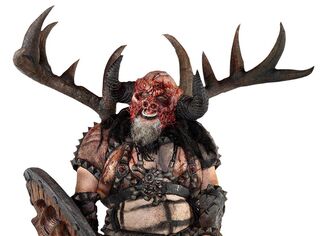Identity
Heavy Metal GWAR and the Power of Identity
Dr. Michael Bishop discusses the concept of “personal economics.”
Posted August 11, 2022 Reviewed by Michelle Quirk
Key points
- We use the collective identity of groups to develop our own sense of personal identity.
- Sometimes our commitment to a collective identity can challenge or harm our personal identity.
- Setting boundaries with groups when our personal identity is being compromised can protect our love for ourselves and the group.
One of the ways that we understand and develop ourselves as individuals is how we connect to groups. As individuals, we have our own personal identity, with our unique sense of purpose and values. And the communities that we identify with—family, friends, religious organizations—have a collective identity, with its own purpose and values.

Balancing Our Own Needs With the Needs of the Group
In an ideal world, we find communities that are a perfect vehicle for developing our own individual identity. For example, if an individual musician forms a band with other like-minded musicians, and all members of that band have the same creative vision and professional goals, the collective identity of the band can be a fantastic vehicle for developing the individual musician’s personal identity. The problem is that it’s rare to find communities whose identity perfectly matches our own throughout the course of our life. Once we become a member of a group, we must often balance our own needs with the needs of the group. And it can be difficult to figure out how much we should sacrifice our individual identity for the collective identity of a group.
To learn more about this issue, I spoke with Dr. Michael Bishop, who is not only an expert in the concept of identity but also a member of the heavy metal band GWAR. GWAR is considered one of the greatest heavy metal bands of all time and functions as a powerful community. It is an art collective in which there is an elaborate mythology around the group, and in which each band member is also a character. The band has a loyal fan base and been putting out albums for more than 30 years, including their recent album The New Dark Ages.
A recent documentary of the band—This Is GWAR—tackled the issue of how band members understood their personal identity within the context of the collective identity of the band. Dr. Bishop had joined GWAR as a bassist in 1987, and took on the persona of “Beefcake The Mighty.”
Leaving and Rejoining the Band
In the documentary, Dr. Bishop discusses an event in 1993 in which bandmate Peter Lee was shot and wounded. The band’s handling of this event resulted in his questioning whether he could maintain his own sense of personal identity while being a member of GWAR, and he left the band. Then, 20 years later, in 2014, when founding GWAR member David Brockie died, Dr. Bishop decided to reconnect with the band. Dr. Bishop eventually became the lead singer of the band, taking on the persona of “The Beserker Blothar.”
During our discussion, Dr. Bishop discussed what he described as the concept of “personal economics.” He asked himself the basic question of whether he can love himself while loving the band at the same time. Or did he need to sacrifice who he was in order to be part of this community? And we came to understand that, by leaving GWAR when he did, Dr. Bishop found that his love both for himself and the members of GWAR remained intact. And that love is what ultimately drove him to reconnect with GWAR 20 years later.
GWAR's Collective Identity
To understand Dr. Bishop’s personal economics and his relationship to GWAR, we must start with his understanding of GWAR’s collective identity. He understood that perhaps one of GWAR’s greatest strengths is the sense of community that it fosters among members of the band, crew, and the fans to create music and perform live shows. And this sense of community has been a central part of Dr. Bishop’s own personal identity. “GWAR functions as this unique thing,” Dr. Bishop told me. “And it's been the central theme of my life…being a part of that thing.…The uniqueness of the band definitely comes from this sense of collective responsibility for something.”
And, yet, being part of such a strong community inevitably comes with sacrifice of one’s own personal identity. “In the end, everybody is serving this one central goal. And everybody agrees that the most important thing is pushing this thing forward. And we do that by all sharing a sense of identity.…We're a part of this thing that needs to move forward,” he explained. “And so we need to, at least to some degree, be prepared to sacrifice the…self in some ways.”
Bi-directional Relationship Between Personal and Collective Identity
But the relationship between personal identity and collective identity is bi-directional. Just as individuals need to sacrifice for the collective, the collective only survives through the ongoing investment of the individuals. “Fans love to say, ‘GWAR can last a million years’…because you just get these different people to put the suits on.…That's not true.…It's gonna last as long as the people who are involved in it continue to love each other. And are willing to and feel as if they all understand one another. And are able to articulate that sense of group identity through a creative output,” Dr. Bishop described. “And that turns out to be…very resilient.…But, at the same time, it's also very fragile.…The level of sacrifice of identity or sacrifice of individualism gets pretty extreme.”
After years of devotion to GWAR, Dr. Bishop recalled how the band’s response to Lee’s shooting challenged his own personal identity. He felt that the band’s commitment to the collective compromised the individual member’s ability to cope with this traumatic experience. “I remember distinctly getting that call…an hour or two later.…We're coming up there and we're going to pick you up; we're gonna bring you back to Richmond to shoot this video. And I remember being like ‘No, you're not,’” Dr. Bishop recalled. “I'll never forget that they did show up the next morning.…It was an extremely traumatic thing to happen. And it impacted me greatly.…Less than four months later, I was out of band. Because it felt very just unconscionable to me that we would continue on.”
Dr. Bishop felt that previously, the collective identity of the band had been a strong vehicle for also building his personal identity, and he was therefore willing to sacrifice for that collective. But he felt that now, his personal identity was being harmed by the collective identity and values of the band. “This is another example of the show must go on…and people not caring for themselves in the way that they should.…That's the incident…at the heart of that question for me, right of individuality, and finding a self-identity.…The tacit social agreement…you have that pact. What I realized later is that it ended for me when that happened…I was no longer a part of that. That incident put me on the outside of it,” he explained. “It was a matter of…personal economics. It's like, it just started costing me more to do it, than I was taking away from it. And so I had to stop.”
Following his departure from GWAR, Dr. Bishop spent the next 20 years playing in other bands, getting his Ph.D. and teaching. But the death of GWAR co-founder David Brockie made him reach out to his former band. “What drew me back into that path was Brockie’s death…knowing what these guys had been through, to keep this thing going. And understanding that just how profoundly unfair it felt that they were going to lose all of that,” he recalled. “So that's really another traumatic event that sort of brought me in.…One incident got me out, and another brought me back then.”
Driven by Love
In retrospect, Dr. Bishop recognized both his departure from and return to GWAR was driven by love—being able to both love himself as part of his personal identity, as well as loving the collective identity of GWAR and its members. And he reflected particularly on his love for the late Brockie. “You start looking back over your life…I had to come to the conclusion…this man loved me. And I loved him,” Dr. Bishop described. “But that's a messy thing, right? It's not simple. And people aren't, aren't simple.…Love isn't all about feeling good all the time. It's about struggle and commitment and caring and hurt."
And as long as he and others can experience that love as an individual and as a collective, GWAR will endure. “I mean, the minute that people stop wanting to do it, this is going to suck,” Dr. Bishop said.
“And that hasn't happened.”
Listen to the conversation with Dr. Bishop here.




